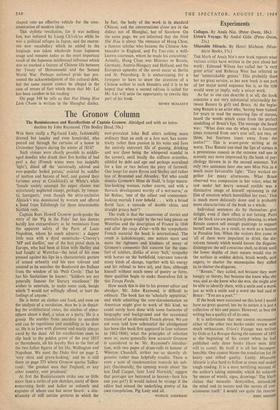Experiments
THE blurb of Anais Nin's new book repeats what various critics have written in the past about her work : Edmund Wilson has called her 'a very great artist' and Rebecca West has referred to her 'unmistakable genius.' This probably does her no great service, as her new book is not part of her major novel sequence but is, as the title would seem to imply, only a minor work.
As far as one can describe it at all, the book concerns a not very substantial relationship be- tween Renate (a girl) and Bruce. At the begin- ning Renate is an artist who, 'having been trained for years to read the unmoving lips of statues, heard the words which came from the perfect modelling of Bruce's lips. The message she heard was: "What does one do whe9 one is fourteen times removed from one's true self, not two, or three, but fourteen times away from the centre?" ' This is avant-garde writing at its worst. That Renate can read the lips of statues is a pretentious conceit in the extreme and one is scarcely any more impressed by the hunk of psy- chology thrown in in the second sentence. Yet only two sentences later one sees Miss Nin in a much more favourable light : 'They worked to- gether for many afternoons. What Bruce observed was compassion in her voice, what he saw under her heavy sensual eyelids was a diminutive image of himself swimming in the film of emotion which humidified her eyes.' This is much more delicately done and is probably more characteristic of the book as a whole.
Individual sentences do by themselves give delight, even if their effect is not lasting. Parts of the book too are particularly pleasing, as when Renate cannot sell enough paintings to support herself and has, as a result, to work as a hostess in Paradise Inn. When the visitors first came in `all of them were impatient to drink the dis- solvent remedy which would loosen the disguise, disintegrate the self-conscious shell, to drink until the lower depths of their nature would rise to the surface in sodden debris, brash words, acid angers, to shatter the mannequins they stifled in, to shatter the disguises.
' "Renate," they called, not because they were hungry or thirsty, but because she knew who she was, and as she knew who she was, she might also be able to identify them, with a smile and a word, just as with a smile and a word she had said to Bruce : "You are a poet." '
If the book were sustained on this level I would have no great quarrel, but by its nature it is just a collection of bits and pieces. However, at best the writing has a quality all of its own. It is unfortunate that one cannot recommend either of the other two books under review with much enthusiasm. Urien's Voyage was written by Gide at La Rocque during the summer of 1892 at the beginning of his career when he had published only three books (there were fifty still to come). By itself it is all but incompre- hensible. One cannot blame the translation for its heavy and stilted quality. Lastly, Miserable Miracle is also hard to follow at times and makes tough reading. It is a most terrifying account of the author's taking mescalin, which he achieves `by means of words, signs, drawings.' The blurb claims' that mescalin 'demystifies, unmasking the mind and its secrets and the secrets of con- sciousness itself.' 1 would saw quite the reverse.
JOHN HORDEK


































 Previous page
Previous page